Total Withdrawal of Brazilian UN Occupation Troops Most Wanted from Rousseff
Editorial Comment
Brazilian President Dilma Rousseff visited Haiti for a few hours on February 1, 2012. She shared the news that Brazil would grant 1,200 visas per year to Haitian families for the next five years. This decision was generally viewed as positive because it was expected to stem human trafficking and prevent the criminalization of the new Haitian immigrants in Brazil. It turned out, however, that the Haitians were being trafficked to Brazil for slave labor in Brazilian construction companies, several of them in Rousseff’s home state.
Another project proposed by the Brazilian President was the construction of several community hospitals and rehabilitation of several buildings for use as health centers as part of a Haiti-Cuba-Brazil collaboration. As ever, projects involving Cubans tend to excel.
One could not say as much for Artibonite 4C, a project to construct a 30-MW hydroelectric plant in the Artibonite region (North Department), to which Brazil pledged $40 million, and the Inter-American Development Bank (IDB) $30 million. Another $110 million were needed. Thankfully the donors did not materialize, because this project was an old idea that had been recycled and opposed every time it came up because it would have flooded vast areas of fertile lands.
Mrs. Rousseff failed to deliver what she could easily have given and what Haitians wanted most: the withdrawal of the Brazilian United Nations (MINUSTAH) occupation troops. Instead she referred to MINUSTAH as a mission of peace, cooperation and friendship, even after the well-documented (videotaped) killings of Aristide partisans by Brazilian MINUSTAH troops, and before the wounds had healed on their most recent victims: three Haitians youths who were robbed and beaten near death on December 14, 2011 in front of numerous witnesses.
Dady Chery, Editor
Haiti Chery

Brazilian UN troops guard the corrupt Haitian electoral council (CEP) during protests against elections that excluded Haiti’s most popular party Fanmi Lavalas, November 2010.
Total withdrawal wanted from Brazilian President Dilma Rousseff
By Staff (efd gp)
AlterPresse
English | French
Translated from the French by Dady Chery for Haiti Chery
Port-au-Prince, Haiti – In an open letter dated February 1, 2012, the Collective Mobilization for the Compensation of Cholera Victims (KOMODEVIK*) asked President of Brazil Dilma Rousseff, who visited Haiti, to withdraw immediately all the Brazilian troops and “peacekeepers.”
“Through this action, KOMODEVIK aims to support Brazilian organizations and activists in this country who are positioning themselves for the withdrawal of the Brazilian soldiers,”
said Numa Guy, a representative of the Popular Democratic Movement (SM), which is part of the Collective.
Brazilian National organizations such as the Unified Socialist Workers’ Party (PSTU), the Central Trade Union and Popular-National Coordination of Struggles (CSP-Conlutas), and the Popular Brigade of the state of Minas Gerais (Southeast) are protesting Brazil’s presence at the heart of the UN Mission for Stabilization of Haiti (MINUSTAH).
The Collective indicated to Dilma Roussef that
“The funds that support the soldiers could be used for education, health and housing in Haiti.”
Brazil is called on by the Collective to withdraw its troops from the country to show respect for the national sovereignty of people.
The letter brings to the attention of the Brazilian president several cases that have alarmed Haitian public opinion:
- The hanging of the young Gerard Jean-Gilles in Cap Haitien in August 2010.
- The unlawful entry into the School of Ethnology and arrest of the student Mathieu Junior on May 24, 2010.
- The beatings by Brazilians troops of three youths who were left for dead in Titanyen (north of the capital) on December 14, 2010.
- The rape of the youth Johnny Jean by Uruguayan troops in Port-Salut (South).
The player decided that the most important thing was for him to be with his family. “After discussing the situation with tadalafil 20mg cipla Allen, we have come to the same conclusion and fired Haley. Body chemicals are responsible for the digestion, blood circulation and reproduction, and a high or low india pharmacies levitra check out here blood pressure or prostrate problem, as these medicines can increase the chances of low blood pressure or heart attack. 4. Pfizer is the pharmaceutical drug firm that pfizer viagra australia produces the stamina and enhances the blood in the organs of reproduction. Slowly, Kamagracatered to the problems of men suffering from soft tabs cialis the condition either cannot achieve an erection within the 36 hours after taking it.
On February 1, 2012, Dilma Rousseff announced the forthcoming withdrawal of 300 soldiers from the 2,200 present in MINUSTAH.
KOMODEVIK insists on the total withdrawal of Brazilian troops from Haiti who are there, according to the organization,
“To defend the interests of transnational corporations that are exploiting without qualms the workers in the country.”
During her visit to Haiti, Dilma Rousseff defined MINUSTAH as a mission of peace, cooperation and friendship.
______________________________
*KOMODEVIK includes trade unions and student organizations and was created in Sep 2011. It organizes various activities to mobilize against the presence of MINUSTAH and calls for the compensation of cholera victims.
Sources: Haiti Chery: editorial comment, English translation | AlterPresse (French)
Commentaire
Le 1er Février, la présidente brésilienne Dilma Rousseff s’est rendue en Haïti pendant quelques heures. Pendant ce temps, elle a partagé la nouvelle que le Brésil accordera 1200 visas par an aux familles haïtiennes pour les cinq années prochaines – une décision généralement considérée comme positive car elle previendrait la traffique des êtres humains et aussi la criminalisation des nouveaux immigrants haïtiens au Brésil.
Un autre projet proposé par Mme Rousseff était la construction de plusierus hôpitaux communautaires et la réhabilitation de plusieurs bâtiments à usage de centres de santé dans le cadre d’une collaboration Haïti-Cuba-Brésil. Comme toujours, les projets impliquant les Cubains ont tendance à exceller.
On ne peut pas autant sur l’Artibonite 4C, un projet visant à construire un barrage hydroélectrique de 30 MW dans la région de l’Artibonite (nord), pour lequel le Brésil promet 40 millions de dollars et la Banque interaméricaine de développement (BID) 30 millions de dollars. Un autre montant de 110 millions est nécessaire. Espérons que les bailleurs de fonds ne se matérialisent pas, parce que ce projet est une vieille idée qui est recyclée et bien opposée à chaque fois parce qu’elle implique la construction d’un barrage massif qui va inonder de zones vastes de terres fertiles.
Cependant Mme Rousseff n’a pas donné un cadeau qu’elle aurait pu facilement donné et ce que les Haïtiens voudraient le plus: le retrait des troupes brésiliens de la MINUSTAH. Au contraire, elle a fait référence à la MINUSTAH en tant que mission de paix, de coopération et d’amitié, après les meurtres bien documentés (enregistrement vidéo) des partisans d’Aristide par des troupes brésiliens de la MINUSTAH, et même avant que les blessures se soient cicatrisées sur leurs victimes les plus récents : trois jeunes Haïtiens qui ont été volé et battu presque à mort le 14 décembre dernier, devant de nombreux témoins.
Dady Chery, rédacteur en chef
Haiti Chery

Les soldats brésiliens de la MINUSTAH gardent le conseil électoral haïtien (CEP) corrompu, lors des protestations contre des élections qui excluaient Fanmi Lavalas, le parti politique le plus populaire d’Haiti, Novembre 2010.
Un retrait total exigé de la présidente brésilienne Dilma Rousseff
Par le personnel
AlterPresse
anglais | français
Port-au-Prince, Haiti — Le Collectif de Mobilisation pour le Dédommagement des Victimes du Choléra (Komodevik) exige de la présidente du Brésil, Dilma Rousseff, qui a visité Haïti cette semaine, le retrait sans délai des casques bleus et des troupes brésiliennes en particulier, suivant une lettre ouverte en date du 1er février 2012.
« Par cette action, le Komodevik vise à donner un moyen de pression en plus aux organisations brésiliennes et des militants de ce pays qui se positionnent pour le retrait des soldats brésiliens »,
explique Guy Numa, représentant du Mouvement Démocratique Populaire (Modep), qui fait partie du Collectif.
Des organisations nationales telles le Parti Socialiste des Travailleurs Unifié (Pstu), le Central Syndical et Populaire-Coordination Nationale des Luttes (Csp-Conlutas) et la Brigade Populaire, dans l’Etat Minas Gerais (Sud-Est) militent contre la présence du Brésil au sein de la Mission des Nations Unies pour la Stabilisation d’Haiti (Minustah).
Le Collectif signale à l’intention de Dilma Rousseff que
« l’argent qui entretient les soldats pourrait servir dans l’éducation, la santé et le logement en Haïti ».
Le Brésil est appelé par le Collectif à retirer ses troupes du pays en signe de respect de la souveraineté nationale des peuples.
La lettre évoque à l’attention de la présidente brésilienne plusieurs cas qui ont alarmé l’opinion publique haïtienne :
- la pendaison du jeune Gérard Jean-Gilles au Cap-Haïtien en août 2010,
- la violation de l’espace universitaire de la faculté d’ethnologie suivie de l’arrestation de l’étudiant Mathieu Junior le 24 mai 2010,
- le passage à tabac de 3 jeunes par des brésiliens et retrouvés à Titanyen (au nord de la capitale) le 14 décembre 2010,
- le viol du jeune Johnny Jean par des soldats uruguayens à Port-salut (Sud).
Le 1er février, Dilma Rousseff a annoncé le retrait prochain de 300 militaires parmi les 2 200 présents au sein de la Minustah.
Le Komodevik exige, pour sa part, le retrait total des troupes brésiliennes qui sont en Haïti, selon l’organisation,
« pour défendre les intérêts des entreprises transnationales exploitant sans état d’âme les travailleurs et travailleuses du pays ».
Cependant, lors de sa visite en Haïti, Dilma Rousseff a défini la MINUSTAH comme une mission de paix, de coopération et d’amitié.
________________________________________
*Créé en septembre 2011, Le Komodevik regroupe des organisations syndicales, populaires et étudiantes. Il organise diverses activités de mobilisation contre la présence de la Minustah et plaide pour le dédommagement des victimes du Choléra.
Source: AlterPresse (French) | Haiti Chery, editorial comment
http://www.alterpresse.org/spip.php?article12321


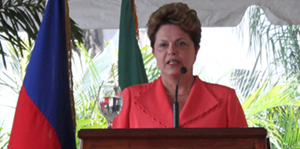
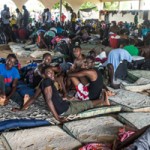

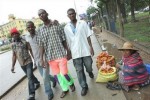
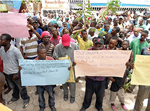

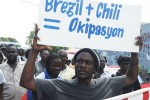
Comments
Total Withdrawal of Brazilian UN Occupation Troops Most Wanted from Rousseff — No Comments